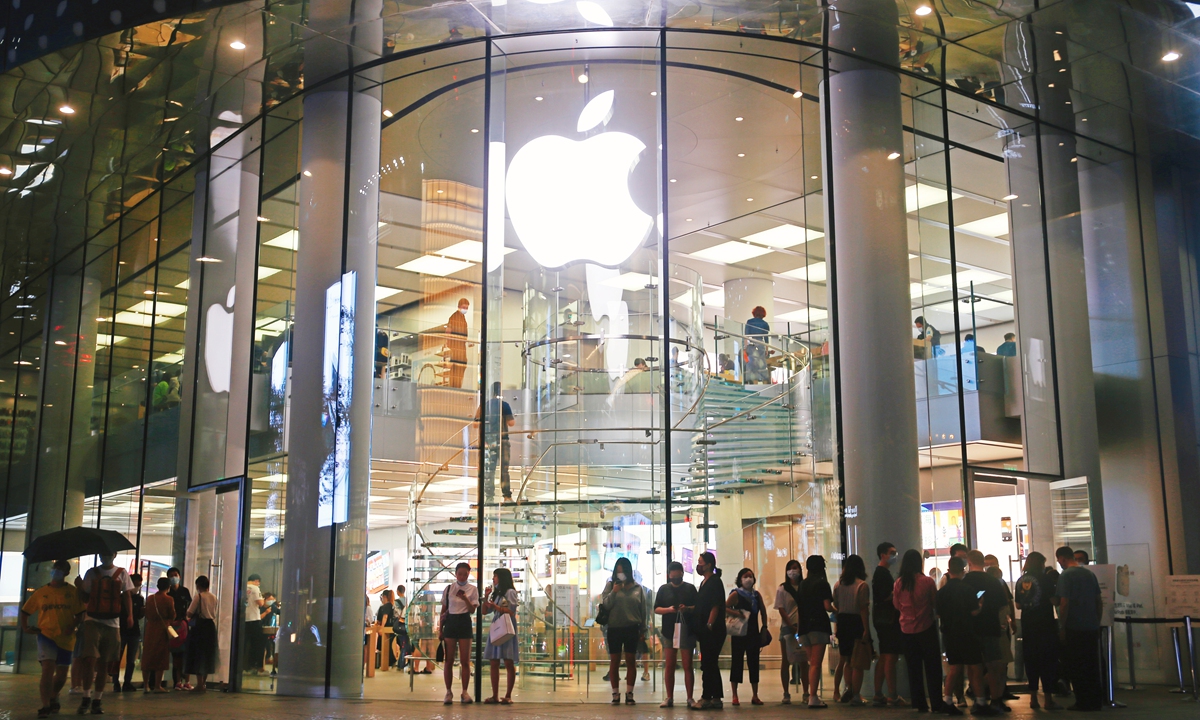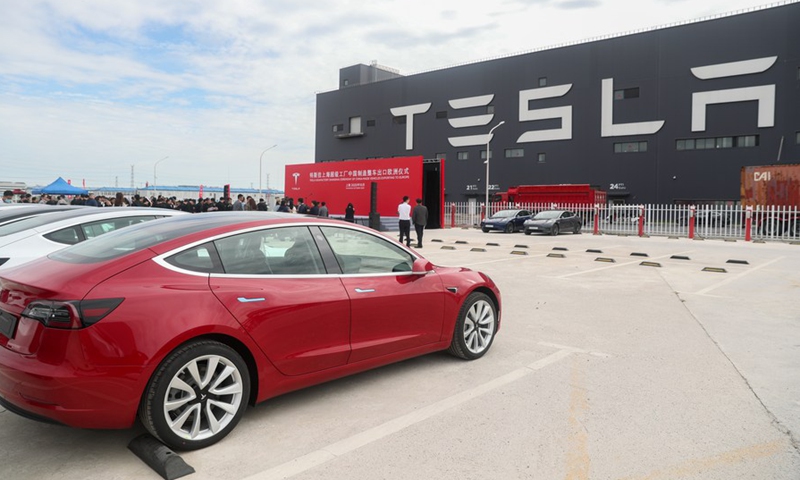
Photo: CFP
Business has never been better for US high-tech companies operating in China, with a number of leading industrial giants including Apple and Tesla reporting eye-catching revenue figures in China in their latest financial reports, as they enjoyed the windfall from China's abundant consumption power and opening-up policies in spite of continued China-US political tensions.
This should serve as a catalyst for US companies to deepen pressure on the US government, with lobbying or other forms of influence, to avoid a complete break with China and treat China related issues more tactfully and with caution, experts told the Global Times.
One example of such US tech companies is Apple, which reported lately that it earned $25.78 billion in the China market, up 20 percent on a yearly basis, in the first quarter of 2022 fiscal year that runs from October 2021 to December 2021, according to Apple's latest financial report released on Thursday. The China market is the only region where the US mobile phone maker gained an above 20 percent growth during the season, the report showed.
In general, Apple's revenues surged 11 percent on a yearly basis to $123.95 billion in the first quarter of 2022 fiscal year. This makes the highest revenue season for the company and largely beats previous market expectations which were set at around $119 billion.
This is a typical example what the Chinese market could offer to US tech firms, as Chinese customers spending recovered stronglyin the wake of the country's largest coronavirus outbreak in early 2020.
In the fourth quarter of 2021, Apple had accounted for 23 percent of China's mobile phone market in terms of shipment, not only ranking the first but also seeing a 79 percent increase from the previous quarter, data from global consulting firm Counterpoint Research showed recently. This is also the first time in six years that Apple topped China's mobile phone market.
"As Huawei's market share fades in China's medium and high-end mobile phone market as a result of the chip ban, Apple almost has no competitor in this field in China," Zhang Yi, CEO of consulting and research firm iiMedia Research Institute, told the Global Times on Friday.
According to Zhang, as Huawei is working to solve the chip supply bottleneck, which is unlikely to see substantial results in the next one or two years, Apple is expected to maintain its lead in the China market during the period, and it's very probable China will become Apple's largest regional market in terms of revenues by the end of this year.

Tesla Photo:Xinhua
Apart from Apple, some other US tech companies are also reporting sweeping business performance in China. Last year, US electric car giant Tesla's Shanghai plant delivered more than 480,000 cars, accounting for more than half of Tesla's global deliveries, according to data revealed by the China Passenger Car Association and Tesla's Q4 2021 financial results.
Information sent by Tesla to the Global Times showed that Tesla's production of Model 3 and Model Y cars in China continued to climb in 2021, and the Shanghai Gigafactory continued to be Tesla's "major export center."
Cristiano Amon, CEO of US tech giant Qualcomm, also said in a recent interview that the company's revenue growth in China has provided huge momentum for the firm's core chip business. Qualcomm will release its Q1, 2022 fiscal year report in a few days.
The US tech companies' surging gains from the Chinese market is in stark contrast to what Chinese firms' went through in the US market, with the US government carrying out sanctions against multiple Chinese firms, from TikTok to Huawei, using multiple measures, from kicking them out of US capital markets to cutting off supply of US-made components .
"The fact that US companies are making big money in China is evidence that a friendly commercial environment is beneficial to both sides. It also reflects the two countries' gap in pushing opening-up reforms, as the US is politicizing economic issues while the Chinese policies draw a line between political tensions and economic interaction," Zhang said.
Experts also noted that the US companies' success in China will further "backfire" on US policies toward China, as US companies might exert pressure on the Biden administration not to sabotage their prospects in the market.
"The US has a lot of interests related to the Chinese market, and because of this, the US government will be pressured to treat China issues very carefully so that they don't hurt their own interests. This will also make it hard for anti-China policies and sanctions to be implemented thoroughly," Zhang said.
Bai Wenxi, chief economist for IPG China, told the Global Times that US companies' good business in China will exert a degree of (positive) influence on US government's policies toward China, but won't be able to change the general tone of US policies toward China.
"US' policies on China have shifted to a general tone of confrontation. This is unlikely to change fundamentally in the short term," he told the Global Times.
However, Zhang said that judging from China's 8.1 percent GDP growth last year, US' policies toward China didn't lead to a significant impact on China's economic development. In contrast, it is critical for Chinese companies to develop self-reliant business solutions, which is a good thing for them in the long run despite temporary fluctuations, similar to what Huawei is facing currently.





